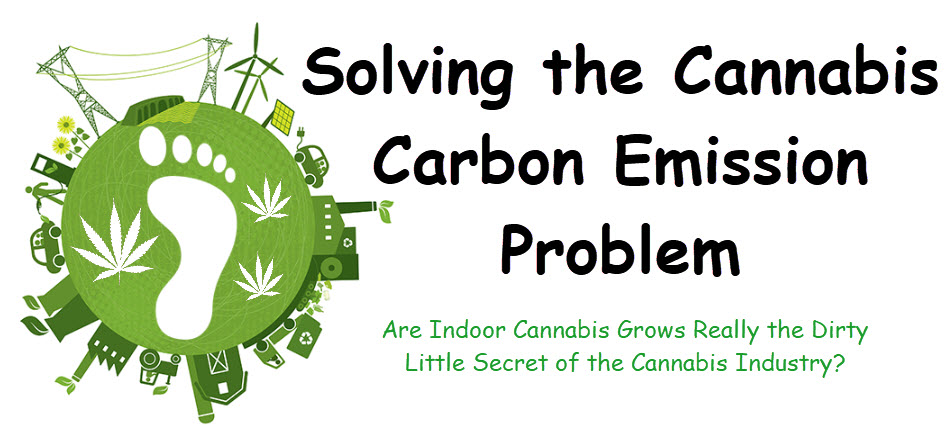REC articles are not the view or opinion of Alpha Extract Administrators
CANNABIS AND THE ENVIRONMENT.

I recently read an article that spoke about the cannabis industry’s “dirty little secret”. Essentially, they are trying carbon emissions to in-door grow operations. Let’s face it, the assumption that indoor facilities emit a lot of carbon is not too far fetched.
Taking a look at the average consumption of lights, cooling, ventilation, irrigation and so forth, the carbon can stack. According to the article, each kilo of marijuana generates 4600 KG of CO2 emissions. I’d assume that they are quantifying the data for indoor operations. Since outdoor cultivation would offset emissions by absorbing it from the atmosphere. We’ll get into that later.
For now, let’s follow the premise of the article. Let’s say that the data presented to us is true. I’m not saying it is true, I’m saying, let’s do an exercise of logic. Let’s explore the potentials of this problem, because if it’s even half true…it’s something that an industry that is poised on being “natural” would have to address.
So let’s identify what causes the Carbon Emissions:
- Lights
- Ventilation
- Irrigation
- Climate Control
All of this of course only truly relates to indoor operations, outdoor grows would not require as much power. In other words, solving the issue for the “biggest consumer” would provide solutions to the “smaller consumer”.
How to Address the Issue
Firstly, it’s a no brainer that solar and alternative energy sources should be incorporated into every cannabis grow. Why not utilize the natural resources we have at our disposal to reduce the impact of production? Of course, this would mean that the technology would need to become more accessible, however with an elevated interest from the cannabis industry, this could mean that the cost of operations would decrease.
Nonetheless, this would need to be something that individual players within the cannabis supply chain would need to adopt. Government incentives would help such as reduced taxes for switching to greener alternatives. It looks nice on paper, however, try to get politicians to do anything significant impactful, and you’re talking to the walls.
Another approach that would drastically reduce the carbon emissions and provide similar results to indoor operations would be to create hybrid systems. In other words, green houses. Some states however do not allow crops to be “uncovered”, however by simply promoting the idea of “hybrid facilities” would reduce the costs of operations.
Canada already has a few of these in operation which provides year-long growing potential, however with a significant reduction of power costs during summer times. Having these systems in the US would also drastically reduce the carbon emissions per grow by supplementing grow lights with natural sunlight.
Expand the Hemp Cultivation
The solutions we spoke about thus far only relates to things you can physically do for indoor grows, however if you really want to tackle the issue of CO2 emissions, plant hemp. For every ton of hemp produced, 1.63 tons of carbon is removed from the air.
It makes sense to plant as much hemp as possible because apart from removing carbon from the air, it also helps to replenish the soil after each crop. With the United States having the “green light” when it comes to hemp cultivation, it might be in the interest of ecological groups to invest into hemp farming.
Of course, this would take actually doing something about the issue of carbon emissions as opposed to frantically typing away your anxiety and sharing it with the digital world.
Promote Outdoor Cultivation
Finally, coming back to the actual growing of “smoke-able cannabis”, promoting outdoor cultivation would also help to reduce the power consumption of the industry. This would require some legislative changes in certain states, however if the environment is truly a point of contention, it would be a simple fix.
Less Talk More Action
It’s important to look out for the environment, however being a keyboard warrior does nothing to solve the problems we face. Within the cannabis industry, there are solutions that are currently not being implemented due to the laws choke-holding the private entities within the marketplace.
Once more, the prohibitionist rhetoric is not allowing the industry to make the necessary changes. The lobbying of political parties bickering over “who’s right” and pandering to the masses for votes, stifle progress and effective change.
Our cannibalistic materialism and hunger for control keeps us from implementing the changes needed to curve the emissions we create. However, nothing changes if we keep on talking about it. It’s time to make the changes, to do it on an individual level.
For the cannabis industry, it’s as simple as adopting a few measures, investing for more sustainable cannabis production. For consumers, it would mean choosing to shop from suppliers that utilize green energy as a means to motivate the market. That’s the absolute least you could do.
